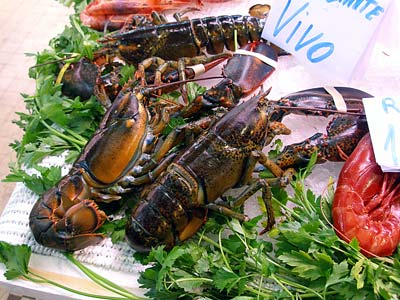Hotpot. A soup-cum-stew often made with skirt of beef, bacon, pig's ears, breast, shoulder and loin with cabbage, onions, carrots, potatoes and other vegetables. The broth is generally served as a separate course from the meats and vegetables.
Air potato. An intrusive, but one of the most widely consumed varieties of yam cultivated in the Pacific Islands, Asia and West Africa. Uncultivated versions may be bitter and even poisonous (as in Florida).

Lobster. The European lobster is a large, marine shellfish with huge claws and is dark, mottled blue-black before cooking, turning red during the process. The flesh is sweet and tender. The Maine or American lobster found in the United States is huge in size and lacks the wonderful sweetness of its European cousin. American varieties may sometimes be brick red before cooking. In Europe they are likely to up to 2 kg (4¼ lbs) while North American ones may be a lot larger. Increasingly, American lobsters are imported for use in Europe.
A lobster with a sauce of cream and Pineau des Charentes or dry white vermouth, or a mixture of cognac and fresh grape juice.
A classic method of cooking lobster sautéed in oil, flambéed with brandy, and served in a cream and white wine sauce, flavoured with garlic, shallots and tomatoes. The origin of Homard à l’américaine is controversial, some claiming that it was invented by the chef Pierre Fraisse, a native of Languedoc who spent some time in United States. The one thing that is certain is that, containing such ingredients as oil and garlic, it is unlikely to originate from Armorica (the ancient name for Brittany). Alternatively, can indicate a garnish of cornflour (US: corn starch) fritters with sliced fried sweet potatoes, for meats.
A classic method of cooking lobster sautéed in oil, flambéed with brandy, and served in a cream and white wine sauce, flavoured with garlic, shallots and tomatoes. The origin of Homard à l’américaine is controversial, some claiming that it was invented by the chef Pierre Fraisse, a native of Languedoc who spent some time in United States. The one thing that is certain is that, containing such ingredients as oil and garlic, it is unlikely to originate from Armorica (the ancient name for Brittany). Alternatively, can indicate a garnish of cornflour (US: corn starch) fritters with sliced fried sweet potatoes, for meats.